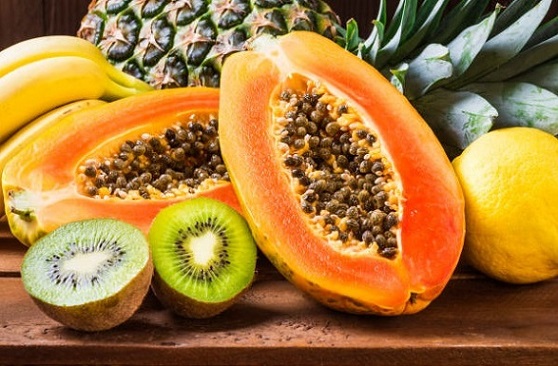Nikhil Prasad Fact checked by:Thailand Medical News Team May 07, 2025 9 months, 6 days, 23 hours, 16 minutes ago
Medical News: A Natural Alternative to Harmful Drugs
Inflammation is a normal immune response that helps the body fight off infection, heal from injuries, and recover from damage. But when inflammation becomes chronic—lasting for months or even years—it can lead to serious health problems such as autoimmune disorders, cancer, heart disease, diabetes, and Alzheimer’s. Traditionally, doctors have relied on drugs like NSAIDs, corticosteroids, and biologics to control inflammation. However, these drugs often come with side effects and may not work well over long periods.
 Natural Enzymes Could Be the Game Changer for Inflammation Therapy
Natural Enzymes Could Be the Game Changer for Inflammation Therapy
Now, scientists at Yeungnam University in the Republic of Korea have discovered that special enzymes—naturally occurring proteins that carry out chemical reactions in the body—could offer a safer and more effective alternative. Led by Dr. Kannan Badri Narayanan from the School of Chemical Engineering and the Research Institute of Cell Culture, this
Medical News report explores how enzyme-based treatments could change the future of medicine.
How Enzymes Help Fight Inflammation
Enzymes play a vital role in keeping our bodies healthy. They act like tiny machines that speed up chemical reactions and help maintain balance inside our cells. Certain enzymes, especially those from natural sources like fruits, vegetables, and even microbes, have shown powerful anti-inflammatory effects.
The study identified two main types of enzymes useful for fighting inflammation:
-Oxidoreductases: These include enzymes like catalase and superoxide dismutase (SOD), which break down harmful reactive oxygen species (ROS) and reduce stress on cells. These enzymes help lower inflammation at its root.
-Hydrolases: This group includes trypsin, chymotrypsin, bromelain, papain, and serratiopeptidase. These enzymes break down proteins and substances that cause swelling and pain, helping to clean up damaged tissues and promote healing.
Researchers also noted that engineered enzymes such as Tobacco Etch Virus (TEV) protease and botulinum neurotoxin type A (BoNT/A) have shown promising results in regulating inflammation at a deeper cellular level.
Key Findings from the Study
The scientists provided detailed evidence on how these enzymes work:
Catalase converts hydrogen peroxide, a harmful by-product of cell activity, into water and oxygen. This process reduces inflammation by preventing damage to healthy cells.
SOD neutralizes superoxide radicals—one of the most harmful types of ROS—helping to lower inflammation, especially in conditions like colitis and arthritis.
Trypsin and chymotrypsin were shown to enhance wound healing by clearing fibrin and dead tissue while reducing swelling.
Bromelain, found in pineapples, and papain, from papaya, r
educe swelling and pain by breaking down protein debris at injury sites.
Serratiopeptidase, produced by bacteria, helps dissolve mucus and scar tissue, and is already being used in Japan and the United States for a range of inflammatory conditions.
Furthermore, recent advances in biotechnology have allowed scientists to modify these enzymes for better performance. For instance, they can now be delivered using nanoparticles or attached to stabilizing agents that make them last longer in the body and reduce the chances of side effects.
A Safer and More Targeted Therapy
One major advantage of enzyme-based treatment is its ability to target only the harmful inflammation without affecting other healthy systems in the body. Many of these enzymes are naturally occurring and can be engineered to avoid triggering immune reactions. Some formulations have already shown success in animal models and early clinical trials.
For example, Aurozyme, a special enzyme-coated gold nanoparticle, was able to treat colitis in mice by calming inflammation in the intestines and restoring healthy tissue. Another approach used Spirulina-based hybrids loaded with catalase-mimicking particles to treat ulcerative colitis in lab animals. Both methods showed strong potential with minimal side effects.
Conclusion
This groundbreaking research from Yeungnam University highlights how natural and engineered enzymes could be the future of treatment for a wide range of inflammatory diseases. By safely targeting the causes of inflammation and avoiding the drawbacks of traditional drugs, enzyme-based therapies may soon offer new hope for millions of people suffering from chronic conditions. With further research and clinical testing, these biological solutions could usher in a new era of medicine that is both precise and personalized. The medical community is now paying close attention to how these enzymes can be developed into widely available treatments.
The study findings were published in the peer reviewed journal: Pharmaceutics.
https://www.mdpi.com/1999-4923/17/5/606
For the latest in treating inflammation, keep on logging to Thailand
Medical News.
Read Also:
https://www.thailandmedical.news/news/phytochemicals-from-acanthopanax-senticosus-plant-found-to-block-brain-inflammation-and-cognitive-decline-in-alzheimer
https://www.thailandmedical.news/news/the-phytochemical-carnosol-found-in-rosemary-destroys-influenza-a-virus-and-reduces-lung-inflammation
https://www.thailandmedical.news/news/shiitake-mushrooms-show-incredible-promise-in-fighting-gut-inflammation-and-colon-cancer
https://www.thailandmedical.news/pages/thailand_doctors_listings
